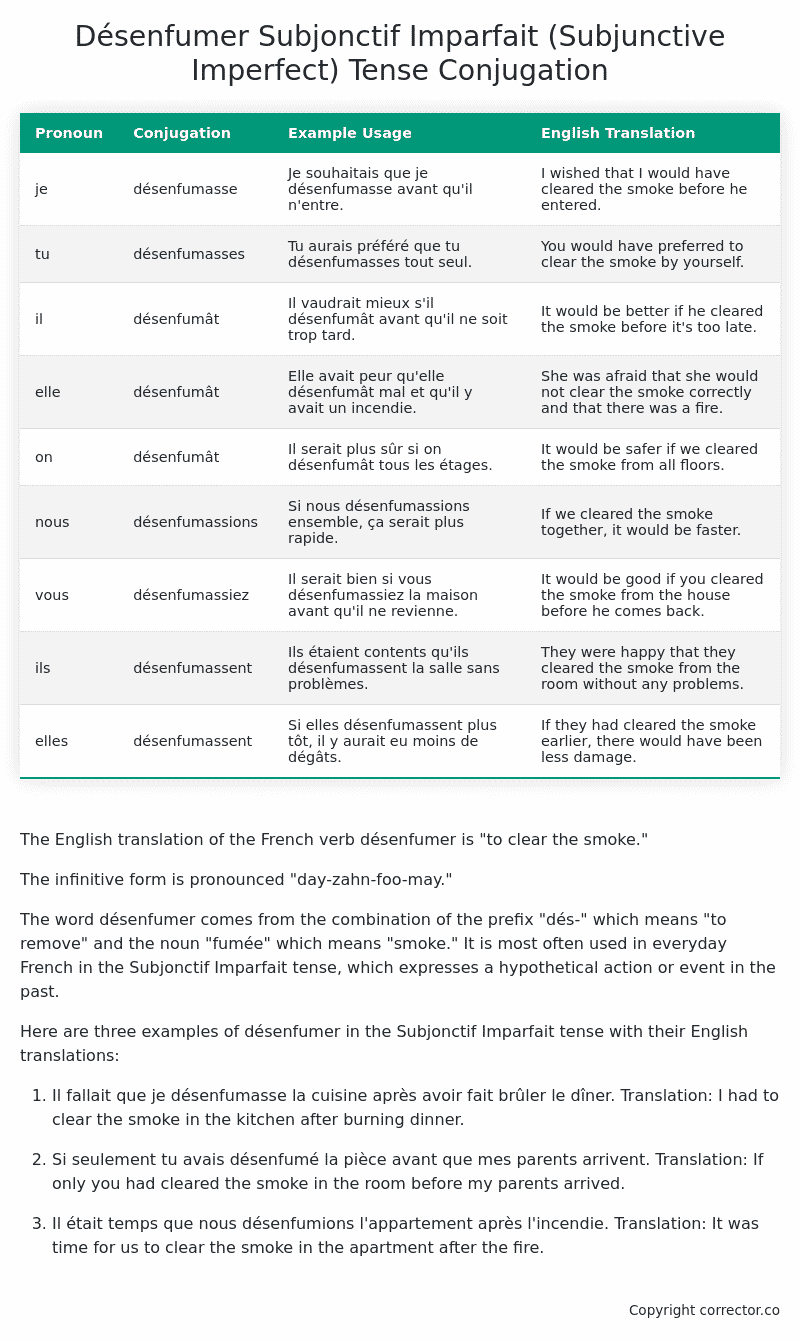Subjonctif Imparfait (Subjunctive Imperfect) Tense Conjugation of the French Verb désenfumer
Introduction to the verb désenfumer
The English translation of the French verb désenfumer is “to clear the smoke.”
The infinitive form is pronounced “day-zahn-foo-may.”
The word désenfumer comes from the combination of the prefix “dés-” which means “to remove” and the noun “fumée” which means “smoke.” It is most often used in everyday French in the Subjonctif Imparfait tense, which expresses a hypothetical action or event in the past.
Here are three examples of désenfumer in the Subjonctif Imparfait tense with their English translations:
-
Il fallait que je désenfumasse la cuisine après avoir fait brûler le dîner.
Translation: I had to clear the smoke in the kitchen after burning dinner. -
Si seulement tu avais désenfumé la pièce avant que mes parents arrivent.
Translation: If only you had cleared the smoke in the room before my parents arrived. -
Il était temps que nous désenfumions l’appartement après l’incendie.
Translation: It was time for us to clear the smoke in the apartment after the fire.
Table of the Subjonctif Imparfait (Subjunctive Imperfect) Tense Conjugation of désenfumer
| Pronoun | Conjugation | Example Usage | English Translation |
|---|---|---|---|
| je | désenfumasse | Je souhaitais que je désenfumasse avant qu’il n’entre. | I wished that I would have cleared the smoke before he entered. |
| tu | désenfumasses | Tu aurais préféré que tu désenfumasses tout seul. | You would have preferred to clear the smoke by yourself. |
| il | désenfumât | Il vaudrait mieux s’il désenfumât avant qu’il ne soit trop tard. | It would be better if he cleared the smoke before it’s too late. |
| elle | désenfumât | Elle avait peur qu’elle désenfumât mal et qu’il y avait un incendie. | She was afraid that she would not clear the smoke correctly and that there was a fire. |
| on | désenfumât | Il serait plus sûr si on désenfumât tous les étages. | It would be safer if we cleared the smoke from all floors. |
| nous | désenfumassions | Si nous désenfumassions ensemble, ça serait plus rapide. | If we cleared the smoke together, it would be faster. |
| vous | désenfumassiez | Il serait bien si vous désenfumassiez la maison avant qu’il ne revienne. | It would be good if you cleared the smoke from the house before he comes back. |
| ils | désenfumassent | Ils étaient contents qu’ils désenfumassent la salle sans problèmes. | They were happy that they cleared the smoke from the room without any problems. |
| elles | désenfumassent | Si elles désenfumassent plus tôt, il y aurait eu moins de dégâts. | If they had cleared the smoke earlier, there would have been less damage. |
Other Conjugations for Désenfumer.
Le Present (Present Tense) Conjugation of the French Verb désenfumer
Imparfait (Imperfect) Tense Conjugation of the French Verb désenfumer
Passé Simple (Simple Past) Tense Conjugation of the French Verb désenfumer
Passé Composé (Present Perfect) Tense Conjugation of the French Verb désenfumer
Futur Simple (Simple Future) Tense Conjugation of the French Verb désenfumer
Futur Proche (Near Future) Tense Conjugation of the French Verb désenfumer
Plus-que-parfait (Pluperfect) Tense Conjugation of the French Verb désenfumer
Passé Antérieur (Past Anterior) Tense Conjugation of the French Verb désenfumer
Futur Antérieur (Future Anterior) Tense Conjugation of the French Verb désenfumer
Subjonctif Présent (Subjunctive Present) Tense Conjugation of the French Verb désenfumer
Subjonctif Passé (Subjunctive Past) Tense Conjugation of the French Verb désenfumer
Subjonctif Imparfait (Subjunctive Imperfect) Tense Conjugation of the French Verb désenfumer (this article)
Subjonctif Plus-que-parfait (Subjunctive Pluperfect) Tense Conjugation of the French Verb désenfumer
Conditionnel Présent (Conditional Present) Tense Conjugation of the French Verb désenfumer
Conditionnel Passé (Conditional Past) Tense Conjugation of the French Verb désenfumer
L’impératif Présent (Imperative Present) Tense Conjugation of the French Verb désenfumer
L’infinitif Présent (Infinitive Present) Tense Conjugation of the French Verb désenfumer
Struggling with French verbs or the language in general? Why not use our free French Grammar Checker – no registration required!
Get a FREE Download Study Sheet of this Conjugation 🔥
Simply right click the image below, click “save image” and get your free reference for the désenfumer Subjonctif Imparfait tense conjugation!

Désenfumer – About the French Subjonctif Imparfait (Subjunctive Imperfect) Tense
Formation
Common Everyday Usage Patterns
Interactions with Other Tenses
Subjonctif Présent
Indicatif Passé Composé
Conditional
Conditional Perfect
Summary
I hope you enjoyed this article on the verb désenfumer. Still in a learning mood? Check out another TOTALLY random French verb conjugation!


